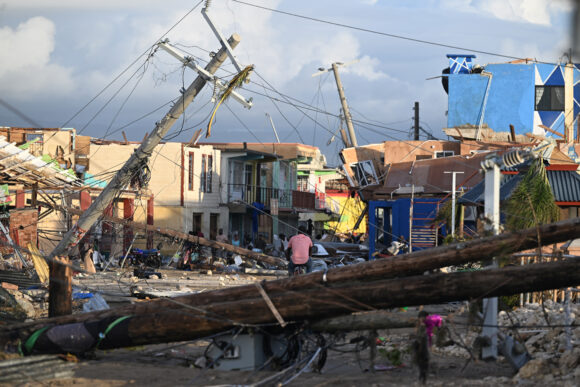Hurricane Melissa became the most powerful storm on record to strike Jamaica in part because of water made hotter and air made wetter by global warming, a new analysis has found.
The storm was also one of the strongest to ever form in the Atlantic, with winds reaching 185 mph shortly before making landfall in Jamaica. Those extreme wind speeds were five times more likely and 7% more intense because of climate change, according to the new analysis by World Weather Attribution, a scientific group that dissects extreme weather events days after they occur. That’s an important finding because relatively small increases in wind speed cause exponential increases in damage, said Friederike Otto, WWA co-founder and professor in climate science at Imperial College London.
Read more: Jamaica to Get Record $70.8M Parametric Payout for Hurricane Melissa
The WWA team also found that climate change made Melissa’s five-day rainfall total about 30% more intense in Jamaica and twice as likely compared to a world without greenhouse gas pollution. The analysis was more stark for eastern Cuba, where Melissa made landfall a day later, finding that climate change made the intense rainfall nine times likelier.
Much of Melissa’s amped intensity was driven by a sea that was nearly 1.5C hotter than average. The warmth reached down dozens of meters, an unusually deep well of energy to fuel the storm. The high Caribbean Sea surface temperatures were six times more likely than would have been in the previous climate.
Dozens died in the path of the storm, across Jamaica, the Dominican Republic and Haiti, according to the United Nations. Jamaican Prime Minister Andrew Holness estimated losses will be as high as $7 billion, equivalent to a third of the nation’s 2024 GDP. Verisk Analytics, Inc. put the upper end of the country’s insured losses at $4.2 billion in a country where less than 20% of homes are insured.
The damage comes as Jamaica is still in the process of recovering from last year’s Hurricane Beryl.
“These types of back-to-back shocks make it harder for people to fully recover when they’re hit by yet another shock,” said Roop Singh, an extreme weather attribution expert at the Red Cross Red Crescent Climate Centre who works with the WWA. “The damage from Hurricane Melissa, of course, is immense, and the full picture is still unraveling as people reach communities that have been cut off due to flooding and landslides.”
Photograph: Damage from Hurricane Melissa, in Black River, Jamaica. Photo credit: Ricardo Makyn/AFP/Getty Images
Topics Catastrophe Natural Disasters Hurricane Climate Change
Was this article valuable?
Here are more articles you may enjoy.



 State Farm Adjuster’s Opinion Does Not Override Policy Exclusion in MS Sewage Backup
State Farm Adjuster’s Opinion Does Not Override Policy Exclusion in MS Sewage Backup  AI Claim Assistant Now Taking Auto Damage Claims Calls at Travelers
AI Claim Assistant Now Taking Auto Damage Claims Calls at Travelers  Fla. Commissioner Offers Major Changes to Citizens’ Commercial Clearinghouse Plan
Fla. Commissioner Offers Major Changes to Citizens’ Commercial Clearinghouse Plan  Lemonade Books Q4 Net Loss of $21.7M as Customer Count Grows
Lemonade Books Q4 Net Loss of $21.7M as Customer Count Grows 

